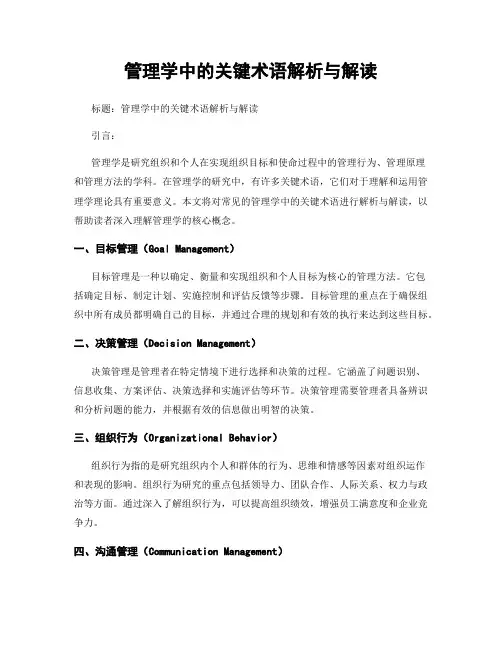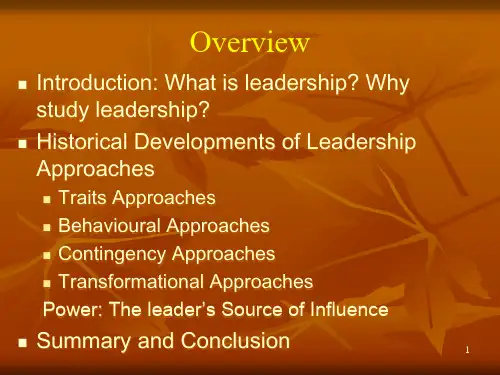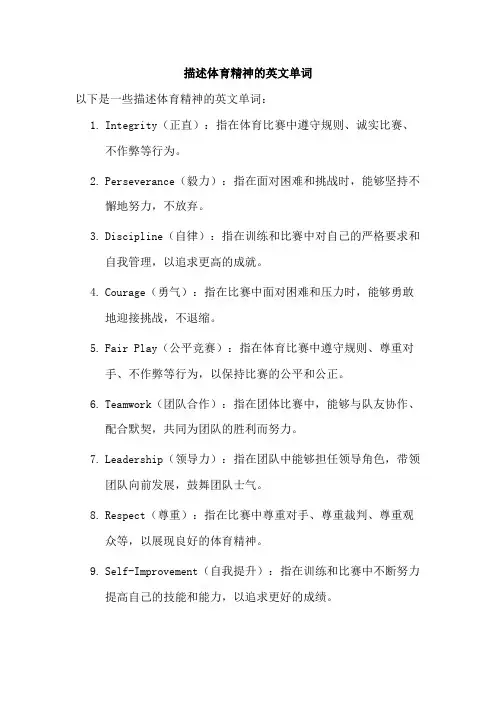leadership(领导力)
管理学中的关键术语解析与解读

管理学中的关键术语解析与解读标题:管理学中的关键术语解析与解读引言:管理学是研究组织和个人在实现组织目标和使命过程中的管理行为、管理原理和管理方法的学科。
在管理学的研究中,有许多关键术语,它们对于理解和运用管理学理论具有重要意义。
本文将对常见的管理学中的关键术语进行解析与解读,以帮助读者深入理解管理学的核心概念。
一、目标管理(Goal Management)目标管理是一种以确定、衡量和实现组织和个人目标为核心的管理方法。
它包括确定目标、制定计划、实施控制和评估反馈等步骤。
目标管理的重点在于确保组织中所有成员都明确自己的目标,并通过合理的规划和有效的执行来达到这些目标。
二、决策管理(Decision Management)决策管理是管理者在特定情境下进行选择和决策的过程。
它涵盖了问题识别、信息收集、方案评估、决策选择和实施评估等环节。
决策管理需要管理者具备辨识和分析问题的能力,并根据有效的信息做出明智的决策。
三、组织行为(Organizational Behavior)组织行为指的是研究组织内个人和群体的行为、思维和情感等因素对组织运作和表现的影响。
组织行为研究的重点包括领导力、团队合作、人际关系、权力与政治等方面。
通过深入了解组织行为,可以提高组织绩效,增强员工满意度和企业竞争力。
四、沟通管理(Communication Management)沟通管理是指管理者为实现组织目标而进行信息传递和交流的过程。
它包括了信息的发送、接收和理解等环节。
沟通管理能够促进组织内部和外部各方之间的有效沟通,提高信息的传递效率和准确性,避免信息失真和误解。
五、领导力(Leadership)领导力是指管理者通过影响和激励下属,推动组织实现目标的能力。
优秀的领导者能够激发员工的工作热情,调动团队的积极性,并有效地利用资源以实现预期的结果。
领导力的核心在于影响和激励他人,通过自身的行为和价值观来塑造组织文化。
六、团队合作(Teamwork)团队合作是指组织内成员之间通过协作和互动来共同实现目标的能力和行为方式。
领导力教案ppt课件

马期很想和子贱交流一下工作心得,于是他找到了宓子贱。
宓子贱是一个不到三十岁的小伙子,有着健康的身体和充沛的精力。在他的面前
,巫马期感觉到了一定的压力。但作为师兄弟,大家还是开始了谈话。
两
个人的谈话是从寒暄客套开始的,不过很快就进入了正题。巫马期带着崇拜的眼
神,羡慕地握着子贱的手说:“你比我强,你有个好身体啊,前途无量!看来我
要被自己的病耽误了。”子贱听完巫马期的话,摇摇头说:“我们的差别不在身
体,而在于工作方法。你做工作靠的是自己的努力,可是事业那么大、事情那么
多,个人力量毕竟有限,努力的结果只能是勉强支撑,最终伤害自己的身体;而
我用的方法是调动能人给自己做工作,事业越大可调动的人就越多,调动的能人
越多事业就越大,于是工作越做越轻松。”
情绪掌控:
1、主动保持和谐人际关系;2、公开场合不乱发脾气,不谩骂员工;3
、对员工之指正斥责,能掌握适当场合与情境;4、会换位思考
决断力:
1、碰到问题时,能根据事实,收集正确信息,当机立断做决定,
并勇于承担后果;2、对于突发状况,能作完善的判断与处理。
-
7
领导者的七项责任
确定组织的价值观 确定发展方向和绩效目标 关注顾客需求和期望 营造积极的经营环境 完善组织的治理 评审组织的绩效 履行社会责任
设计 执行 改善
2. 市场
人员 3.
流程 4.
组织运行系统 组织免疫系统
-
21
9洞察力之环境营造
1. 对顾客和伙伴讲求诚信 1-10分
2. 组织有的可持续发展的目标 1-10分
3. 个人有的学习成长的空间 1-10分
4. 5.
员 领工导的人健带康头和遵安守全 游得 戏到 规保 则障1-110-1分0分文
Lesson12Leadership领导力

11
Leadership Styles
One of the better known behavioral approaches was made popular by Kurt Lewin he studied the following leadership styles-
9
Criticism of Trait Model
Does not assign weights to traits Does not consider followers or situations Does not tell you what traits are important Does not take into consideration low
Concern for People (consideration or employee centred)
The extent to which the leader shows respect, friendship, concern for followers’ well-being, comfort and mutual respect between leader and followers
Contingency Approaches
Transformational Approaches
Power: The leader’s Source of Influence
Summary and Conclusion
1
WHAT IS LEADERSHIP?
Leadership is the ability to influence a group toward the achievement of goals (Robbins).
描述体育精神的英文单词

描述体育精神的英文单词
以下是一些描述体育精神的英文单词:
1.Integrity(正直):指在体育比赛中遵守规则、诚实比赛、
不作弊等行为。
2.Perseverance(毅力):指在面对困难和挑战时,能够坚持不
懈地努力,不放弃。
3.Discipline(自律):指在训练和比赛中对自己的严格要求和
自我管理,以追求更高的成就。
4.Courage(勇气):指在比赛中面对困难和压力时,能够勇敢
地迎接挑战,不退缩。
5.Fair Play(公平竞赛):指在体育比赛中遵守规则、尊重对
手、不作弊等行为,以保持比赛的公平和公正。
6.Teamwork(团队合作):指在团体比赛中,能够与队友协作、
配合默契,共同为团队的胜利而努力。
7.Leadership(领导力):指在团队中能够担任领导角色,带领
团队向前发展,鼓舞团队士气。
8.Respect(尊重):指在比赛中尊重对手、尊重裁判、尊重观
众等,以展现良好的体育精神。
9.Self-Improvement(自我提升):指在训练和比赛中不断努力
提高自己的技能和能力,以追求更好的成绩。
10.Winning and Losing(胜败):指在比赛中能够正确对待胜
败,胜不骄、败不馁,以保持平常心态。
leadership领导力

添加标题
添加标题
学习领导力:通过阅读、听讲座、 参加研讨会等方式学习领导力
反思与改进:通过反思和改进不 断提升领导力
实践经验
领导力的发展需要不断学习和实践 领导力的提升需要不断积累经验和知识 领导力的发展需要不断反思和总结 领导力的发展需要不断挑战和突破
反馈与反思
领导力的发展需要不断的反馈和反思 反馈可以帮助领导者了解自己的行为和决策的效果 反思可以帮助领导者总结经验教训不断改进自己的领导方式 反馈和反思可以帮助领导者更好地理解自己和他人的需求提高领导效果
领导力的应用
04
组织管理
明确组织目标:设定明确的组织目标确保 团队成员了解并认同
建立组织结构:设计合理的组织结构明确 职责和权限
选拔和培养人才:选拔和培养具有领导力 的人才提高组织整体素质
激励和激励:制定有效的激励和激励机制 激发团队成员的积极性和创造力
沟通和协调:建立有效的沟通和协调机制 确保信息畅通和团队协作
进行
成果评估: 对项目成果 进行评估总 结经验教训 为未来项目
提供参考
个人发展
自我认知:了解自己的优点和缺点明确自己的职业目标和发展方向 自我提升:不断学习新知识和技能提高自己的专业能力和综合素质 自我激励:保持积极的心态勇于面对挑战不断超越自我
自我管理:合理安排时间提高工作效率保持良好的生活习惯和健康的身体状态
团队协作
建立信任:通过沟通和合作建立团队成员之间的信任 分工合作:明确团队成员的角色和职责确保每个人都能发挥自己的优势 鼓励创新:鼓励团队成员提出新想法共同解决问题 反馈与激励:及时给予团队成员反馈和激励提高团队士气和效率
领导力的挑战与应对
05
变革管理
变革背景: 组织内外部 环境的变化
Lesson_12_Leadership_(领导力)-专业文档资料-PPT文档资料

Participative
Leader allows and expects worker participation Leaders tend to:
Involve subordinates in decision-making through consultation
Asking them for their opinions Share information with subordinates
Extent to which the leader defines and structure the role of the subordinates, such as defining work task, assigning task responsibilities, set clear work standards
Autocratic Democratic Laissez-faire Participative
13
Autocratic
Leaders tells employees what to do Leaders tend to make:
Unilateral decisions Dictate work method Limit worker knowledge about goals to justify the
With leadership, you either use it or lose it.
(Lee laccoca, Chairman of the board of Chrysler
Corp)
cont…
5
Quotes on Leadership
In any case, leadership is finally a collaborative endeavour. (Warren Bennis, author and leadership scholar)
管理的英语表达
管理的英语表达
管理的英语表达包括许多常见的词汇和短语,这些词汇和短语在商业和管理领域中非常常见,因此对于那些想要在这些领域中成功的人来说是必不可少的。
以下是一些常见的管理英语表达:
1. Management: 管理
2. Leadership: 领导力
3. Teamwork: 团队合作
4. Communication: 沟通
5. Performance: 绩效
6. Productivity: 生产力
7. Efficiency: 效率
8. Strategy: 战略
9. Planning: 计划
10. Delegation: 委派
11. Motivation: 动机
12. Innovation: 创新
13. Problem-solving: 解决问题
14. Decision-making: 决策
15. Time management: 时间管理
16. Project management: 项目管理
17. Risk management: 风险管理
18. Budget management: 预算管理
19. Performance evaluation: 绩效评估
20. Employee development: 员工发展
以上是一些常见的管理英语表达,掌握这些词汇和短语可以使你在商业和管理领域中更加自信地交流和工作。
Leadership领导力课件
7
The Great Man Theory
➢ Early explanations of leadership studied the “traits” of great leaders
▪ “Great man” theories (Gandhi, Lincoln, Napoleon) ▪ Belief that people were born with these traits and
➢ Practically
▪ productively, economically, idealistically
➢ Personally
▪ interpersonally, ethically, selfishly
➢ Scientifically
▪ empirically, conceptually
He or she may be someone you work with now or someone you knew in the past. This coworker does not have to be the person you like least but should be the person with whom you had the most difficulty in getting a job done.
Criticisms include most of research was in the lab
16
Path-Goal Theory (House 1971)
Path-goal theory focuses on the kinds of leader behaviors that allow subordinates to achieve personal and organizational goals
英语六级作文预测:领导力 Leadership
英语六级作文预测:领导力 Leadership(最新版)编制人:__________________审核人:__________________审批人:__________________编制学校:__________________编制时间:____年____月____日序言作文(composition)是经过人的思想考虑和语言组织,通过文字来表达一个主题意义的记叙方法。
作文分为小学作文,中学作文,大学作文(论文)。
作文体裁包括:记叙文、说明文、应用文、议论文。
作文并不神秘,要想写好一篇文章,首先要多看,多想,勤于观察,积累素材。
只有细致的观察生活,积累素材才是写好作文的基础。
首先要明确你要写的主题,认真的审题,列出大纲,不要只注意题目中要求的字有多少,要多注意题目的本身,要多读多想,准确的用好词语和修饰语。
这是审题的关键,要确立好主题的依据,要精心的选材,布局列题,有的材料,还要分析整理。
这就要对材料进行分类,比较,概括,筛选。
我们不要象盖房子那样的把所有的材料都堆砌起来,要合理恰当的组合,具体的说开头和结尾要略写,那么经过就要仔细的推敲,修辞,润色,写好以后不要急于交稿,反复检查认真的修改。
古人说:书读百遍,其义自见。
熟读唐诗三百首,不会作诗也会吟。
这些都说明一个道理,只要你多看书,多读书对你的写作文有一定的好处。
只要你明白这样的一个道理,作文就是要你把生活中喜,怒,哀,乐用文字经过加工,修饰。
整理,也就是我们说的作文。
作文内容What is leadership? Its qualities are difficult to define. But they are not so difficult to identify. Leaders don't force other people to go along with them. They bring them along.什么是领导?它的品质是很难定义的。
Leadership领导力演示课件
Who Will Lead? (cont)
➢ Demographic background of leaders
▪ Height, weight, & age ▪ Ethnicity ▪ Sex: Bias against women (even thought women
possess more skills needed to be a successful leader).
What is Leadership ?
“The process of influencing the activities of an organized group in its efforts toward goal setting and goal achievement” (Stogdill, 1950, p. 3)
▪ Trait Model: The great leader theory ▪ Situational Model ▪ Interactional Model: depends on the leader,
followers, and the Great Man Theory
only the great people possessed them
The Great Man Theory
➢ Personal qualities of leaders
▪ Personality traits, such as extraversion, conscientiousness, and openness.
➢ Practically
▪ productively, economically, idealistically
➢ Personally
- 1、下载文档前请自行甄别文档内容的完整性,平台不提供额外的编辑、内容补充、找答案等附加服务。
- 2、"仅部分预览"的文档,不可在线预览部分如存在完整性等问题,可反馈申请退款(可完整预览的文档不适用该条件!)。
- 3、如文档侵犯您的权益,请联系客服反馈,我们会尽快为您处理(人工客服工作时间:9:00-18:30)。
Leadership
A: I’ve heard of a interesting viewpoint I’d like to share with you.
S: Really, what is it?
A: Effective managers are not necessarily true leaders.
S: That’s interesting, but why?
A: The secret lies on the ability to lead effectively, which can set the excellent managers apart from the average ones. Many managers focus on superficial activities and worry about short-term profits and stock prices, too few have emerged as leaders who foster innovation and attainment of long-term goals.
S: I see, that means true leadership includes effectively orchestrating important change. While management requires structuring the organization, staffing it with capable people, and monitoring activities; leadership goes beyond these functions by inspiring people to attain the vision. Great leaders keep people focused on moving the organizaion toward its ideal future, motivating them to overcome whatever obstacles lie in the way.
A: That’s right. And there are two kinds of leadership supervisor and strategic leadershi p. Supervisory leadership is behavior that provides guidance, support and corrective feedback for the day-to-day activities of work until members. Strategic leadership gives purpose and meaning to organizations. And it needs to be an activity performed by people throughout the organization, not just by a few people at the very top.
S: Yes, leadership is very important to a organization. But organizations succeed or fail not only because of how well they are led but because of how well followers follow.
A: I agree with you. The most effective followers are capable of independent thinking and at the same time are actively committed to organizational goals. As a manager, you will be asked to play both roles. As you lead the people who report to you, you will report to your boss.
S: Do you know what is the important factor of effective leadership?
A: It’s power----the ability to influence other people. In organizations, this often means the ability to get things done or accomplish one’s goals despite resistance f rom others.
S:That’s right.
A: Do you know what are the sources of powers?
S: There are 5 sources, authority, control over rewards, control over punishiments, appealing personal characteristics, and expertise. Do you know traits the leaders have can distinguish effective leaders from other people?
A: I think the first one is drive. It refers to a set of characteristics that reflect a high level of effort. Drive includes high need for achievement, constant striving for improvement, ambition, energy, and initiative. Second is leadership motivation.Great leaders not only have drive; When the power need is exercised in moral and socially--constructive ways, rather than to the deteriment of others, leaders will inspire more trust, respect and commitment to their vision.
S: Yes, besides that, integrity , self-confidence, and knowledge of the business are also important. Integrity is the correspondence between actions and words. Self-confidence allows a leader to overcome obstacles, make decisions despite uncertainty, and instill confidence in others. Leaders must have the intelligence to interpret vast quantities of information. Advanced degrees are useful in a career, but ultimately less important than acquired expertise in matters relevant to the organizaion.
A: All in all, leadership means being able to assess others, evaluate the situation, and select or change behavior to more effectively respond to the demands of the circumstances.
S: Yes, I agree with you.。
